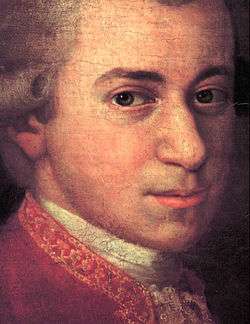Symphony No. 10 (Mozart)
The Symphony No. 10 in G major, K. 74, was written by Wolfgang Amadeus Mozart probably during his first journey to Italy in the spring of 1770.[1]
The symphony is scored for two oboes, two horns and strings. The duration is approximately 9 minutes.
The symphony is in the form of an Italian overture and consists of the following movements:
(No tempo assignments are given in the autograph score.)
The andante section is not written as a separate movement, but as the second part of the opening movement, following immediately after a double bar at m. 118.[2]
The autograph score of the work, which does not contain any additional remarks by Mozart, bears the remark "Ouverture zur Oper Mitridate" (Ouverture to the opera Mitridate) by the hand of Johann Anton André, which is struck out except for the word "Ouverture".[3] Obviously André was under the impression that this piece was originally planned as an overture to Mitridate, re di Ponto (which has an ouverture of its own, different from this symphony).
References
External links
- Sinfonie in G K. 74: Score and critical report (German) in the Neue Mozart-Ausgabe
- Symphony No. 10: Scores at the International Music Score Library Project
